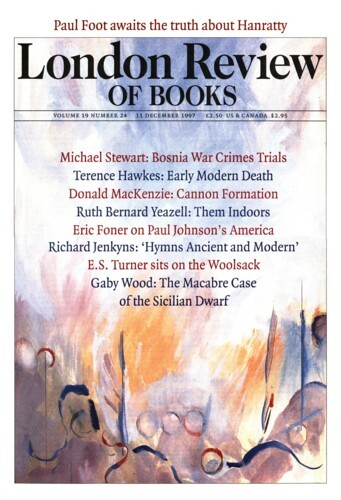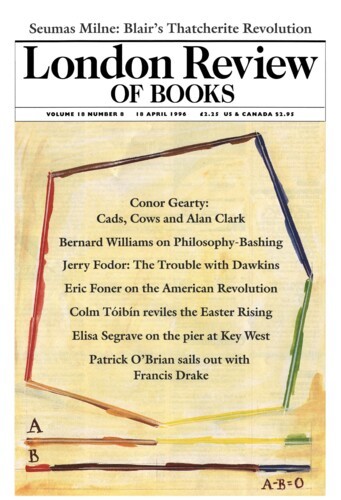Eric Foner
Eric Foner is DeWitt Clinton Professor Emeritus of History at Columbia and the author of many books on Reconstruction, including The Fiery Trial: Abraham Lincoln and American Slavery (2010), which won the Pulitzer Prize for History in 2011.
Eden without the Serpent
Eric Foner, 11 December 1997
Paul Johnson is one of the most indefatigable writers on either side of the Atlantic. In the past twenty years, the former editor of the New Statesman turned ardent Thatcherite has produced, among other books, The Birth of the Modern (weighing in at more than a thousand pages), Modern Times, a massive chronicle of the 20th century, and lengthy histories of Christianity and Judaism. If succinctness is not his forte, neither is modesty. Johnson’s latest book opens with the claim that it ‘has new and often trenchant things to say about every aspect and period of America’s past’. No one who knows his earlier writings is likely to be surprised by its strengths and weaknesses. For better or worse, A History of the American People is vintage Johnson.‘
A Boost for Slavery
20 February 1997
An Agreement with Hell
Eric Foner, 20 February 1997
The United States must be the only country in the world to have lived for more than two centuries under a single written constitution. In France, monarchies and republics, each with its own constitution, have come and gone. Britain has yet to commit its constitution to paper.
‘A Struggle for Power’
18 April 1996
Pieces about Eric Foner in the LRB
Racist Litter: The Lessons of Reconstruction
Randall Kennedy, 30 July 2020
Reconstruction was under attack from the outset. There was never a consensus on its legitimacy, and in the end it sank under the weight of racism, indifference, fatigue, administrative weakness, economic...
A Topic Best Avoided: Abraham Lincoln
Nicholas Guyatt, 1 December 2011
On the evening of 11 April 1865, Abraham Lincoln spoke to a crowd in Washington about black suffrage. The Civil War had been over for a week. Lincoln had already walked the streets of Richmond,...
During the war and after the war
J.R. Pole, 11 January 1990
With the passing of generations, the Civil War will lose its chronological centrality in American history, and may well come to be regarded, not so much as the great crisis of the very principle...
Read anywhere with the London Review of Books app, available now from the App Store for Apple devices, Google Play for Android devices and Amazon for your Kindle Fire.
Sign up to our newsletter
For highlights from the latest issue, our archive and the blog, as well as news, events and exclusive promotions.



